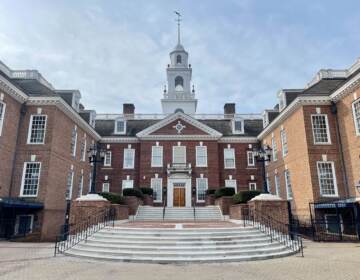Changing Senior Freeze program so those who move aren’t penalized
Bipartisan bill would ensure those who move to a more affordable home would still qualify for property-tax relief

The latest policy change to the Senior Freeze program would allow senior citizens to maintain eligibility for their rebate checks if they move to a new home — instead of their having to wait at least two full tax years to requalify. (http://401kcalculator.org/Flickr)
This article originally appeared on NJ Spotlight.
–
State lawmakers are considering changing one of New Jersey’s most popular property-tax relief programs to ensure senior citizens who move to a more affordable home don’t end up losing a critical tax break in the process.
A bipartisan bill (S-566) that would amend provisions of the relief program known as Senior Freeze easily cleared a legislative committee yesterday; the program uses annual rebate checks to effectively “freeze” property tax bills for many New Jersey seniors or residents with disabilities.
Right now, homeowners must meet several requirements to qualify for Senior Freeze relief checks, including being a New Jersey resident for at least 10 years and living in the same home for at least three years. But lawmakers have become concerned about a potential unintended consequence that some Senior Freeze recipients face due to the three-year residency requirement, which is that the three-year clock has to be reset any time the homeowner moves, even to a cheaper or more accessible home.
The proposed legislative remedy would let homeowners who meet all other qualifications for Senior Freeze relief carry over their full eligibility even after moving to another home.
A barrier to relocating, downsizing
“The bottom line is, our current system right now dissuades and puts up a barrier to relocating and downsizing in New Jersey,” said Sen. Declan O’Scanlon, one of the bill’s primary sponsors. “These folks are on a fixed income.”
The Senior Freeze revision is being proposed as lawmakers have taken other steps in recent years to address affordability concerns for seniors, including increasing the total amount of retirement income that can be excluded from state income taxes.
“We want seniors to be able to continue to live here,” said O’Scanlon (R-Monmouth).
The Senior Freeze program is officially called Property Tax Reimbursement in state tax law, but it gets its more recognizable nickname from the state-funded checks that are sent out annually to more than 100,000 senior-citizen and disabled recipients to offset any increases, thus “freezing” their local property-tax bills.
To qualify for the current program, which dates to 1997, homeowners must be at least 65 years old or disabled, and be at least a 10-year resident of the state. They also have to be the owners of their residence for three years and be up to date on their property taxes.
In addition, state tax law establishes an annual income ceiling for the program, and also allows for annual increases to keep pace with inflation. The income limit for the 2019 tax year is $91,505, according to the Division of Taxation. (The state is mailing out applications for the latest round of Senior Freeze relief this month.)
Property-tax burdens
For years, governors and lawmakers used budget language to hold the Senior Freeze income limit at $70,000, largely as a cost-saving measure. But that practice was ended last year as growing concerns about the burden posed by property taxes — which average close to $9,000 across the state — coincided with a full election year for the state Assembly.
Last year’s action also came on the heels of lawmakers voting in 2016 to gradually expand the state income-tax exclusions for retirement income; that expansion is still being phased in.
The latest policy change proposed by O’Scanlon and several other lawmakers would maintain eligibility for their rebate checks for Senior Freeze recipients who move to a new home — instead of their having to wait at least two full tax years to requalify for the program.
In addition to maintaining eligibility, the bill would let homeowners keep the same base year — the year they first met all qualifications to receive a Senior Freeze rebate check — after they move to a new residence, if that’s lower than the tax bill at their new home. For someone moving into a newly constructed home, the base year would become the first full tax year following the home’s completion, according to the bill, which would take effect immediately if the full Legislature passes it and Gov. Phil Murphy signs it into law.
The Senate’s Community and Urban Affairs Committee passed the measure unanimously on Thursday, picking up praise from both Republican and Democratic panel members along the way.
“This is a good bill,” said committee chair Troy Singleton (D-Burlington).
What will it cost?
The Office of Legislative Services, the Legislature’s nonpartisan research arm, has yet to prepare a fiscal estimate for the bill, so it’s unclear how much extra funding the state would have to set aside for the Senior Freeze program if it is eventually enacted. The program currently costs a little over $200 million to operate annually, with last year’s lifting of the $70,000 cap on annual income adding an extra $18 million to the tab.
But O’Scanlon suggested the state could also pick up some revenue if the new policy change is enacted since it could lead some homeowners to remain in New Jersey instead of leaving due to frustration with high taxes.
“We don’t want to incentivize them to move out of the state,” O’Scanlon said in an interview after the hearing. “These are our grandparents and our parents.”
WHYY is your source for fact-based, in-depth journalism and information. As a nonprofit organization, we rely on financial support from readers like you. Please give today.




